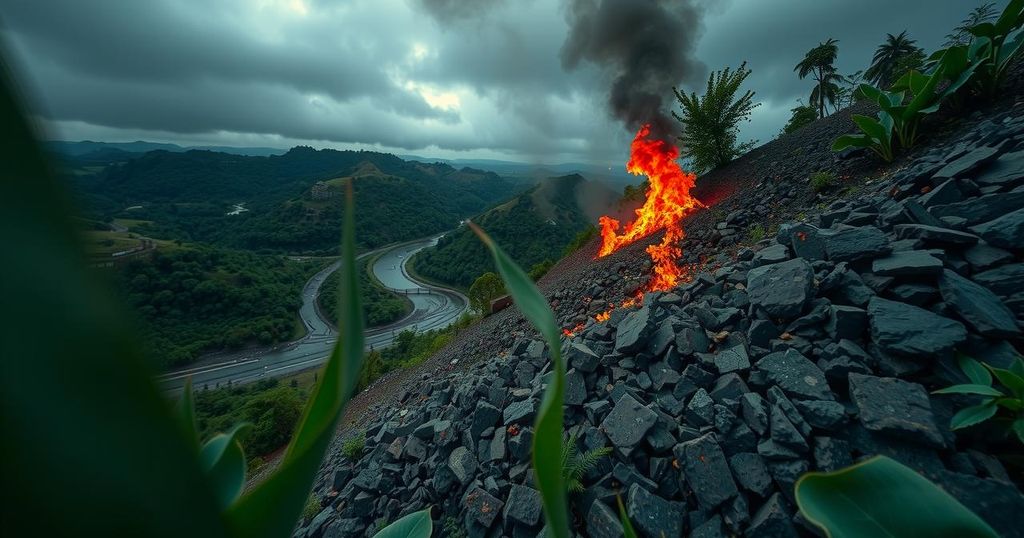Congo’s Desire for UN Peacekeeper Withdrawal Complicated by Ongoing Conflict and Mineral Interests

The Democratic Republic of the Congo desires the withdrawal of U.N. peacekeepers amidst escalating violence from the M23 rebels, backed by Rwanda. The conflict’s complexity is rooted in local annoyances with peacekeeping efforts and significant international interest in the region’s mineral wealth. As the government seeks to take control of its security, the risks to millions of displacement victims increase, revealing the urgent need for a sustainable solution to the ongoing crisis.
The Democratic Republic of the Congo (DRC) is caught in a complex dilemma regarding the presence of United Nations peacekeepers, known as MONUSCO, amidst ongoing violence fueled by rebel groups, particularly the M23, which is widely regarded as being backed by Rwanda. Although the DRC government desires the exit of UN forces by December due to rising frustrations over their perceived ineffectiveness, the escalating conflict complicates this exit and raises concerns about the security of millions of displaced civilians whose safety largely depends on these peacekeepers. Despite the government’s wishes, violence persists, exacerbated by Rwanda’s involvement and the presence of various armed groups in the region, leading to widespread instability and fear among the population. As the conflict rages, MONUSCO remains a crucial presence in eastern Congo, with its approximately 14,000 peacekeepers attempting to adapt their strategies in response to the deteriorating conditions. Their focus includes training Congolese troops and establishing new bases to provide necessary support and protection for civilians caught in the unrest. While U.N. officials have acknowledged the challenges they face, many Congolese citizens express disappointment in the mission, feeling that it has not adequately addressed the realities on the ground, resulting in protests against these peacekeepers. The rich mineral resources of eastern Congo, including cobalt and tantalum, significantly contribute to the conflict, drawing international attention and interest. M23’s recent seizure of strategic mining areas raises critical questions regarding both local security and foreign exploitation of Congolese resources. Despite evidence of Rwanda’s questionable conduct in the region, the international community’s response has been notably tepid, driven by economic interests tied to these minerals. In summary, the situation remains precarious, with ongoing fighting and an uncertain future for both the Congolese population and the international peacekeeping efforts aimed at stabilizing the region.
The Democratic Republic of the Congo has been embroiled in conflict for decades, particularly in the eastern regions rich in mineral resources. The continued violence has led to widespread displacement, presenting a significant humanitarian crisis. The United Nations established MONUSCO, a peacekeeping mission, to help stabilize the region, but their presence has become increasingly contentious as the DRC government and many citizens feel that the force is ineffective in curbing violence from numerous armed groups, particularly the M23 rebels, who are allegedly supported by Rwanda. In recent months, the government has sought a withdrawal of U.N. forces, hoping to take full responsibility for security. However, the complexity of the situation due to persistent armed conflict, international interests in minerals, and lack of trust in local military forces raises critical challenges surrounding this withdrawal.
The conflict in the Democratic Republic of the Congo illustrates a multifaceted crisis, where local governance, international interests, and military dynamics intertwine. While the DRC’s government seeks the removal of U.N. peacekeepers, the ongoing violence and instability make such a move risky for the civilian population. The role of external forces, particularly Rwandan involvement and the exploitation of mineral resources, continues to exacerbate the situation. Therefore, careful consideration is essential in addressing the needs of the Congolese people while negotiating with international stakeholders.
Original Source: apnews.com






